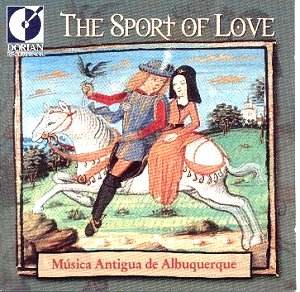The Sport of Love
Songs of Love and the Hunt from the Renaissance and the Middle
Ages
 Musica Antigua de
Albuquerque
Musica Antigua de
Albuquerque
 DORIAN DOR-93175 [63:30]
DORIAN DOR-93175 [63:30]

It is sometimes a good idea for reviewers to expand their horizons. Bearing
this in mind and cognisant of the need to prepare for my lecture series,
in August, at The Earnley Conference (Chichester) about music in the courts
of Europe, through the ages, I deserted my accustomed
19th/20th centuries romanticism to explore the territory
of early music and this album. I was not disappointed.
The album comprises 27 numbers from the Renaissance and the Middle Ages that
were sung in Italy, Germany, France and England. The dedication and scholarship
of Música Antigua de Albuquerque is very impressive in assembling
such material and in the fidelity of their performances using original style
instrumentation. I was continually astounded at the complexity and sophistication
of this music - especially the vocal lines. The spirit of love and hunting
commingles, for hunting was used as a metaphor for amorous courtship.
I will just mention a few of the numbers.
The opening numbers are Italian and the first track is instrumental. We are
told that very few examples of instrumental music survive from the medieval
period. Trotto, strongly rhythmic and vibrant, is named after the
verb trottore, which means "to trot" and probably refers to the
choreography of the dance it accompanied. 'L'aquila bella' is a
14th century madrigal sung here a capella. The florid and
intricate vocal lines beguile the ear and there is an engaging cuckoo chorus.
"Caccia 'Alla caccia su su'" is a catchy instrumental number played on crumhorns,
shawm, drum and tambourine and is concerned with the care of the hunt's hounds.
'So ben, mi c'ha bon tempo' is an engaging merry song in a homophonic
dance-rhythm style for soprano and recorder, vihuela de mano, viols and drum.
Of the German songs, 'Es taget vor dem wald' is a humorous bouncy song for
tenor by Swiss composer Senfl who spent most of his career in Germany in
the early 16th century; while the quieter more tender song for
male voices, 'Ich schwing mein Horn' is about a forlorn hunter who realises
he will never capture the heart of his quarry.
'Blow thy horn, hunter' for three voices belongs to the repertory of English
"foster" songs (from the word "forester") which were probably performed as
part of the courtly May-games or during one of the many pageants enjoyed
by Henry VIII and his court. The lines are filled with bawdy double-entendre.
Another song included here, 'Passtime with good company' is attributed to
Henry himself.
From 16th century France came songs with texts that refer to le
Jeu D' Amours - "the game of love". The texts of the Parisian chansons
of the 1530s and 1540s are set with much attention to the natural flow of
the language, usually with one syllable per note, short melismas mostly towards
the ends of phrases and with musical phrasing matching the poetic structure.
The style of the song here broadens. The old favourite theme of unrequitted
love is now shared with fulfilled love and humour is in fashion. The high-flown
courtly love lyric now is mixed with a more natural poetic diction, for as
the chanson became available to a wider audience, it took on a more popular
style. 'Je ne fus jamais si ayse' with its lovely refrain at its repeated
title line (I was never so content) is a vibrant example of Le jeu d'amours.
A fascinating album and strongly recommended
Reviewer
Ian Lace


![]()